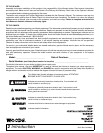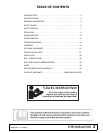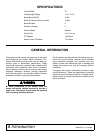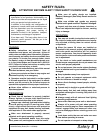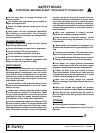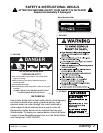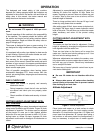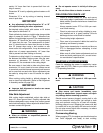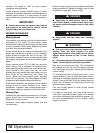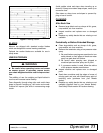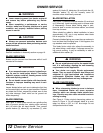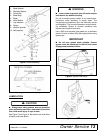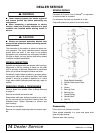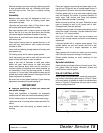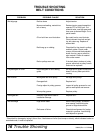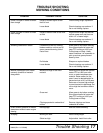
10 Operation
32695 (Rev. 11/17/2006)
increase PTO speed to 1000 rpm and maintain
throughout cutting operation.
During operation mowing vibration tends to loosen
hardware. All hardware should be checked regularly to
maintain proper torque. It is good practice to check
mower before each operation to ensure all hardware is
tight.
IMPORTANT
■ Always raise mower off casters when backing
and turning at the same time to prevent casters
from locking up on front tractor tires.
MOWING TECHNIQUES
Mowing Speed
The condition of the terrain to be cut will determine the
smoothness of final results. For best results, mower
blades should be kept sharp at all times and the mower
as level as possible. When mower blades show exces-
sive wear, they should be replaced.
Proper ground speed for mowing will depend on the
height, type and density of grass to be cut. Normally,
ground speed will range from two to five mph. Tall,
dense grass should be mowed at lower speeds, while
thin, medium height grass can be cut at a faster ground
speed.
Always operate tractor PTO at 1000 rpm maximum
when mowing. This is necessary to maintain proper
blade speed to produce a clean cut. Under certain sea-
sonal conditions, front tractor tires may roll some
grasses down and prevent them from being cut to the
same height as the surrounding area. When this
occurs, reduce the tractor ground speed, operating
tractor PTO at 1000 rpm. The slower speed will permit
grasses to at least partially rebound and be cut.
Under some conditions, the grasses will not rebound
enough to be cut evenly, resulting in an uneven
appearance. In general, lower mowing heights give a
more even cut with less tendency to leave tire tracks.
Mowing Tips
Extremely tall grass should be mowed twice. Cut grass
higher on first pass. Cut the second time at desired
height at 90° to the first pass.
Remember, sharp blades produce cleaner cuts and
use less power.
Before mowing, analyze the area to determine the best
mowing procedure. Consider the height, type of grass
and the terrain type (hilly, level or rough).
■ Keep away. To avoid serious injury or death
from thrown objects or blade contact, never oper-
ate mower without discharge chute or side shield
installed.
■ Keep hands and feet away from discharge
opening.
■ Pick up all rocks, twigs and other debris before
mowing. Enter new areas carefully. Cut grass
higher the first time to allow mower to clear unseen
objects. Never assume an area is clear. Always
check!
■ Clear mowing area of all people when operating
mower. Thrown objects could injure bystanders.
Mow with uncut grass to the right. This will distribute
the clippings over the cut area. Discharging clippings
over uncut grass will cause a buildup and may prevent
uniform cutting.
For a professional touch in large open areas, try the
mowing pattern in Figure 2. Make two passes counter-
clockwise to discharge clippings away from bordering
objects. Then cut the lawn in half by mowing down the
center. Turn clockwise to the right at end of area over
grass previously mowed.
Plan your mowing pattern to travel straight forward
whenever possible.
It is better to mow grass more often rather than too
short. Short grass deteriorates rapidly in hot weather
and invites weed growth during growing seasons. Fol-
low local recommendations for the suitable cutting
height in your area.
A DANGER
A DANGER
A WARNING



